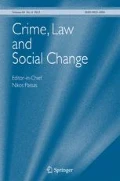Abstract
Hong Kong — Britain's Crown Colony in Asia — is reputed to be one of the world's leading centers for the laundering1 of drug money. Located on the southeast coast of China, Hong Kong is not far from the Golden Triangle in Burma, Laos and Thailand, the source of much of the world's heroin supply. Ethnic Chinese criminal organizations based in Hong Kong and elsewhere have long been involved in the refining, transporting and financing of Southeast Asian heroin. With its bank secrecy laws, its large and sophisticated international banking industry, and its complete absence of currency exchange controls, Hong Kong has all of the necessary components of a modern financial secrecy jurisdiction. It is alleged that billions of dollars are being washed in Hong Kong by both local and overseas drug traffickers, to be reinvested eventually throughout the world. Hong Kong government officials deny the allegation, and cite other reasons to account for the vast sums of U.S. currency that are being repatriated to the West Coast. This paper examines critically the arguments for both positions.
Similar content being viewed by others
References
Banking, “A Drug Bust at the Laundry,” October 28,Asiaweek 1988 (14), 60–61.
Bartlett, Sarah and G. David Wallace, “Money Laundering: Who's Involved, How it Works, and Where it's Spreading,”Business Week 214: 74–80, March 18, 1985.
Block, Alan A. and William J. Chambliss,Organizing Crime (New York: Elsevier, 1981).
Camens, Jane, “Hong Kong at Center of Drug Empire,” Hong Kong:Hong Kong Standard April 1, 1988.
Committee on Governmental Affairs,Crime and Secrecy: The Use of Offshore Banks and Companies (Washington, D.C.: U.S. Government Printing Office, 1983).
Crisswell, Colin and Mike Watson,The Royal Hong Kong Police Force (1841–1945) (Hong Kong: Macmillan, 1982).
Crowell, Todd and Tsang Shuk Wa, “Unmasking the Triads,”Asiaweek 14: 52–57, November 11, 1988.
Dear, Justin, “Move to Hit Traffickers Where it Really Hurts,” Hong Kong:Hong Kong Standard October 25, 1987.
Dear, Justin, “Hong Kong King Nabbed After Four Year Chase,” Hong Kong:Hong Kong Standard March 16, 1988.
Dubro, Alec and David E. Kaplan,Yakuza (New York: Addison-Wesley, 1986).
Finance, “Cleaning up Dirty Laundering.”The Economist 308: 65–66, August 20, 1988.
Freemantle, Brian,The Fix (London: Michael Joseph, 1985).
Government Information Services,Hong Kong 1988 (Hong Kong: Hong Kong Government Printer, 1988).
Grilli, Andrea M., “Preventing Billions From Being Washed Offshore: A Growing Approach to Stopping International Drug Trafficking,”Syracuse Journal of International Law and Commerce 1987 (14), 65–88.
Kaplan, David E., Donald Goldberg and Linda Jue, “Enter the Dragon,”San Francisco Focus: 68–79, December 1986.
Karchmer, Clifford L., “Money Laundering and the Organized Underworld,” in Herbert E. Alexander and Gerald E. Caiden (eds.),The Politics and Economics of Organized Crime (Lexington, MA: Lexington Books, 1985).
Kerr, Peter, “Chinese Muscle in on the Mafia and Heroin Dealers,” Hong Kong:Hong Kong Standard January 5, 1988.
Koepp, Stephen, “Dirty Cash and Tarnished Vaults,”Time 125: 65, February 25, 1985.
Lee, Jacqueline, Lindy Course and Elizabeth Ng., “Family on Drug Charges Face U.S. Extradition,” Hong Kong:South China Morning Post July 27, 1988.
Liu, Melinda and Brian Eads, “Hong Kong's Funny Money,”Newsweek 106: 52, September 23, 1985.
Lueras, Leonard and R. Ian Lloyd (eds.),Hong Kong (Hong Kong: Dah Hua Press, 1985).
Mann, Jim., “U.S. Wary of Hong Kong's Bank Secrecy,” Los Angeles:Los Angeles Times September 15, 1985.
McCoy, Alfred W.,The Politics of Heroin in Southeast Asia (New York: Harper and Row, 1972).
Metcalfe, Tim and David Wallen, “World Drug Ring Arrests Reveal Hong Kong as Key Staging Post,”Hong Kong:South China Morning Post July 27, 1988.
Nadelmann, Ethan A., Unlaundering Dirty Money Abroad: U.S. Foreign Policy and Financial Secrecy Jurisdictions (Cambridge, MA: Center for International Affairs, 1986).
President's Commission on Organized Crime,The Cash Connection: Organized Crime, Financial Institutions, and Money Laundering (Washington, D.C: U.S. Government Printing Office, 1984).
Seagrave, Sterling,The Soong Dynasty (New York: Harper and Row, 1985).
U.S. Department of Justice,Operation Cashflow: The Movement and Impact of International Drug Money (Washington, D.C.: U.S. Government Printing Office, 1983).
Author information
Authors and Affiliations
Rights and permissions
About this article
Cite this article
Gaylord, M.S. The Chinese laundry: International drug trafficking and Hong Kong's banking industry. Contemporary Crises 14, 23–37 (1990). https://doi.org/10.1007/BF00728224
Issue Date:
DOI: https://doi.org/10.1007/BF00728224




